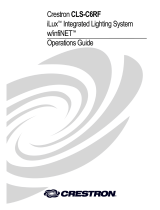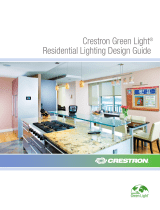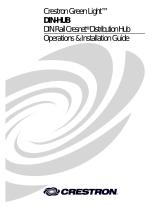
Crestron CSC-DCCN
Cresnet
®
Interface to Crestron
®
CSM-QMT30 Shades
Installation Guide
Crestron Electronics, Inc. Installation Guide - DOC. 7349D
15 Volvo Drive Rockleigh, NJ 07647 (2033155)
Tel: 888.CRESTRON 04.13
Fax: 201.767.7576 Specifications subject to
www.crestron.com change without notice.
Further Inquiries
To locate specific information or resolve questions after reviewing this guide, contact Crestron's True Blue Support at
1-888-CRESTRON [1-888-273-7876] or refer to the listing of Crestron worldwide offices on the Crestron Web site
(www.crestron.com/offices) for assistance within a particular geographic region.
To post a question about Crestron products, log onto the Online Help section of the Crestron Web site
(www.crestron.com/onlinehelp). First-time users must establish a user account to fully benefit from all available
features.
Future Updates
As Crestron improves functions, adds new features and extends the capabilities of the CSC-DCCN, additional
information may be made available as manual updates. These updates are solely electronic and serve as intermediary
supplements prior to the release of a complete technical documentation revision.
Check the Crestron Web site periodically for manual update availability and its relevance. Updates are identified as an
“Addendum” in the Download column.
WARNING: To avoid fire, shock, or death; turn off power at circuit breaker or fuse and test that power is off before
wiring!
NOTES: Observe the following points.
• To be installed and/or used in accordance with appropriate electrical codes and regulations.
• This product should be installed by a qualified electrician.
PREPARING AND CONNECTING WIRES
Strip the ends of the wires approximately 1/4 in (6 mm). Use care to avoid nicking the conductors. Twist together
the ends of the wires that share a connection. Apply solder only to the ends of the twisted wires. Avoid tinning too
far up the wires or the end becomes brittle.
INTRODUCTION
The Crestron
®
CSC-DCCN is an interface designed to control one Crestron CSM-QMT30
shade motor and provide two way communication between the motor and control system
over Cresnet
®
. The CSC-DCCN features local buttons that allow for setting up limits and
testing of the shades without use of the control system. In addition to controlling the shade
motor, the CSC-DCCN provides 24 V power to a CSM-QMT30 motor. The CSC-DCCN can
be surface mounted or mounted in a single gang electrical box using a CSC-BRKT-1G
mounting bracket (sold separately).
Physical Description
This section provides information on the connections, controls and indicators available on the
CSC-DCCN.
Dimensional Drawing
2.49 in
(64 mm)
1.84 in
(47 mm)
2.22 in
(57 mm)
0.19 in
(5 mm)
1.20 in
(31 mm)
2.20 in
(56 mm)
0.14 in
(4 mm)
Ø 0.15 in
(4 mm)
* Interface connectors for G 24 + G -, G 24 and NET ports are provided with the unit.
2.58 in
(66 mm)
0.68 in
(18 mm)
#
CONNECTORS*,
CONTROLS &
INDICATORS
DESCRIPTION
1 G 24
Power input from power supply
2 G 24 + G -
Power and control to roller shade
3 UP
Push button used to raise shade
4 SET
Push button used to enter setup mode
5 DN
Push button used to lower shade
6 SET LED
Red LED indicates the device setup status and error
codes
7 NET LED
Amber LED used to indicate communication status of
the Cresnet network;
LED is solid when the device is connected to the
network and off when no connection to control
system
8 PWR LED
Green LED indicates power and status;
LED blinks while shade is moving. LED is solid when
shade is stopped and powered on
9 NET
24 Y Z G
Two 4-pin 3.5 mm detachable terminal blocks,
Cresnet slave port and power input
Federal Communications Commission (FCC) Compliance Statement
This device complies with part 15 of the FCC Rules. Operation is subject to the following conditions:
(1) This device may not cause harmful interference and (2) this device must accept any interference received, including
interference that may cause undesired operation.
CAUTION: Changes or modifications not expressly approved by the manufacturer responsible for compliance could void the
user’s authority to operate the equipment.
NOTE: This equipment has been tested and found to comply with the limits for a Class B digital device, pursuant to part 15 of the
FCC Rules. These limits are designed to provide reasonable protection against harmful interference in a residential installation.
This equipment generates, uses and can radiate radio frequency energy and, if not installed and used in accordance with the
instructions, may cause harmful interference to radio communications. However, there is no guarantee that interference will not
occur in a particular installation. If this equipment does cause harmful interference to radio or television reception, which can be
determined by turning the equipment off and on, the user is encouraged to try to correct the interference by one or more if the
following measures:
• Reorient or relocate the receiving antenna
• Increase the separation between the equipment and receiver
• Connect the equipment into an outlet on a circuit different from that to which the receiver is connected
• Consult the dealer or an experienced radio/TV technician for help
Industry Canada (IC) Compliance Statement
CAN ICES-3 (B)/NMB-3(B)

The specific patents that cover Crestron products are listed at patents.crestron.com.
Crestron, the Crestron logo and Cresnet are either trademarks or registered trademarks of Crestron
Electronics, Inc. in the United States and/or other countries. Other trademarks, registered trademarks
and trade names may be used in this document to refer to either the entities claiming the marks and
names or their products. Crestron disclaims any proprietary interest in the marks and names of others.
Crestron is not responsible for errors in typography or photography.
This document was written by the Technical Publications department at Crestron.
©2013 Crestron Electronics, Inc.
MOUNTING
The CSC-DCCN can be mounted to a single gang box or to any flat surface. Refer to the
appropriate procedure below for mounting instructions.
Mounting in Single Gang Box
The CSC-DCCN mounts to a single gang box by using the CSC-BRKT-1G (sold separately).
For installation details refer to the CSC-BRKT-1G Installation Guide (Doc. 7353) which is
available from the Crestron Web site (www.crestron.com/manuals).
Surface Mounting
The CSC-DCCN can be mounted to any flat surface using four screws (not supplied). Refer
to the following illustration for a typical surface mount scenario.
WIRING
For information on wiring this device, refer to the latest version of the Crestron Roller Shades
and Interfaces Wiring Guide (Doc. 7516).
PROGRAMMING AND SETUP
Before the roller shade can be operated the device must be programmed and set up.
For information on programming and setup of this device, refer to the latest version of the
Crestron Roller Shades and Interfaces Programming and Setup Guide (Doc. 7361).
/


